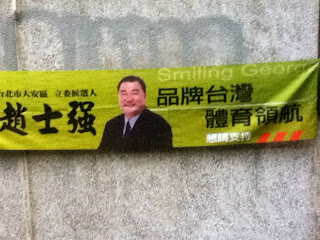 |
| Sure, it only costs NT$250, but for that price it's a pretty decent wine. |
While finishing off a bottle of inexpensive but good wine with Brendan last night, I got to thinking about all the usual stuff: you know, how great married life has been for the past year and a half, how lucky we really are to have such a strong relationship, and
my doesn't this apartment look awesome, I could actually stay in most nights and not feel bored and
hmm, if Tsai wins the election, will she be the sort of women's rights advocate in office that could really benefit Taiwanese women? and
I should really read Shantaram
, it's been on the shelf for a year and
it's too bad that I love my career, really get on with my students, and yet am not happy with my company and it'll be a few months yet before I can make a change.
And then this:
it's been five years. I'm applying for permanent residency after Chinese New Year. Would I have stayed this long if I'd been single.
No, probably not.
Why is that?
Of course, I covered this in
Why Are There So Few Expat Women in Asia?, but it kind of got buried deep in the (admittedly long) post, and wasn't very personal. This post is my attempt to personalize that a bit.
I'd said there that a lot of expat women leave after a few years if they're single,
because it's just plain harder to date (whereas in some regards it's easier for expat men), even if you like the local guys - which, for the record, I would if I were single. Married or enrelationshipped women - yes, I made that word up - seem more likely to stick around in the foreign country they've chosen - especially in Asia. It's been my experience in Taiwan that the long-term expat women I know here are all married or in relationships. In Turkey I noticed that it was quite a different tale: plenty of expat women stuck around, and more than a few married Turkish men, not unlike a lot of the expat men in east Asia.
Clearly, when the dating market opens up to reveal more opportunities, the women tend to stay just as long as the men. I'd like to think that a choice to move abroad or move home is one made individually, for reasons other than romantic prospects but rather for reasons ranging from desire to see the world, to learn a new language, to engage in another culture, for other academic pursuits or because you genuinely enjoy English teaching and the best opportunities for that happen to be in non-English speaking countries.
And it's true that I moved abroad without worrying about romantic prospects, and I happened to get lucky (heh heh). I wasn't here to date - I was here to see more of the world and learn Chinese. I didn't even know yet that I wanted to be a career teacher/trainer/whatever it is that I do because on any given day my job description feels different.
Yet these noble ideas - that one should make these choices without thought to dating - just isn't the case, and it wouldn't have been for me, either.
If Brendan hadn't existed, or we'd never met, or our relationship never worked out, here's what would have likely happened:
Brendan moved to Taiwan about halfway through my first year in Taiwan. I was not planning to leave at the end of that year; at the time my plans were to stay for 2-3 years depending, see if teaching was a good career fit (I'd started to love my evening teaching job back in the USA and hate my corporate desk job, which clued me into the idea that I would do better in a career such as teaching) and then either move home or move to another country. I knew before Brendan came that I would not stay at Kojen past my initial contract, so I would have still changed jobs. I might not have ended up at the company I did - although who knows? They were looking at just about the right time.
I probably would have stayed in my tiny, slightly crummy room in an otherwise nice apartment in Liuzhangli for awhile longer, until I got a new job and could afford a small studio or at least a better room in a shared apartment.
I probably would have dated a couple of guys, be they expat or local. Those relationships, as most tend to do, probably would not have worked out. Although I'm sociable, I'm not exactly an "every weekend at a different social hangout" girl, so there probably wouldn't have been more than one or two. I think that estimate is accurate because that's about half the number of guys I typically dated in a few years in the DC area.
My social circle wouldn't have been appreciably different, except it would lack some people, including one whom I consider to be a very good friend, because those friends came through opportunities brought about by Brendan.
So I probably would have a social life that involved seeing friends for one outing a weekend, occasionally going out on a weekend night if invited (I love making plans for meals or outings for friends, I make drink plans far less often and mostly go when invited). I would otherwise work, take pictures, go hiking occasionally, hang out at cafes and then come home and be alone. My expat male friends, few as they are, would be dating local women at either a far greater frequency or intensity than any dating opportunities I would have had.
Not too unlike my single life in DC, except I had more dating opportunities and, within my own cultural context, it was easier to make friends. I saw those friends more, because
in the USA we seem to place a greater emphasis on time spent with friends vs. at home, with family or working than in Taiwan, where people seem to see friends less.
I would have looked at the expat scene in Taipei - nightlife that I'm mostly not interested in (with some exceptions! Going out occasionally is fun), maybe a few clubs I could have joined, but generally just as I see it now: something I dip my toe into and can enjoy, but never really felt I fit into (although I feel a bit more fitting-inny now that
I am friends with a small group of younger married women like myself who also defy the young-guys-here-teaching-at-Hess-for-a-year and the older-family-types-with-kids-at-the-American-school, and I know a few student types - I tend to get on well with the grad school crowd). I would have concluded that, in part, I felt a bit out of it with the expat crowd. Not unwelcome, but a bit like "young single foreign women who aren't particularly pretty have a tougher time socially here than back home".
I'd have looked at local life in Taipei and probably dipped my toes into that more, as well, but likewise still not felt like I fit in:
turns out people don't invite you out much when you don't fit into a circle of coworkers, classmates or family.
Then I would have looked back at my social life in DC, and then my dating life. I might not have chosen to move back to DC in particular, but I might have concluded that as a single woman, if I wanted a better shot at having good relationships and having one of those turn permanent, and if I wanted lots of friends to have good times with both in the interim and beyond, that my chances of that were far better back home, or in another country.
Perhaps I would have done the CELTA as I did in Istanbul, had the great fun that I did, made friends on the course, and decided that for a good social life, Istanbul would have been a great bet. And I might well have stayed, despite the fact that it would have left me a bit emotionally torn. Or I might have picked another Mediterranean country.
All through this I'd be a bit angry at myself, thinking
what, are you not the nomad and adventurer you thought you were? Are you really going to go home now because poor widdle Jenna doesn't have enough widdle fwiends and nobody wants to be her boyfwiend? Awww. I thought you were made of stronger stuff, and I thought you knew that traveling the world would come with its share of loneliness. Are you just another Typical Girl, who needs people around her instead of fortifying herself? Are you weak? Do you not have the balls you thought you did?
(I admit I have a mortal fear of being seen as weak. That's a good post for another time, if I ever feel like revealing that much about myself).
And of course the final few sentences of the above are ridiculous, and in their own way, sexist, but it's only honest of me to say I would have thought them.
And I would have felt conflicted and angry and a bit sad, but I probably would have also felt lonely and lacking social and dating opportunities - even though they exist in Taipei, I would have found them, as a single foreign woman, insufficient - but in the end I probably would have moved on in my predicted 2-3 years. The fact that I didn't, that I instead married and nested a bit and started to feel a bit settled (and happy about that, which I never thought would happen) and like Taipei was
home. But a big part of that is that I do have a family here. I have a husband - and a cat and (for the time being) a sister. I might have never felt that way if the whole marriage thing hadn't happened, or if I had not at least found myself in a serious relationship.
I'll leave it at this: in 2003 I celebrated my birthday in Pakse, Laos. I was in my early twenties and in Laos by myself (not long before I'd seen off Brendan in Beijing, from where he returned to Korea). I spent my birthday alone, hiking up the crumbled, rocky ruins of a temple carved into a bluff outside of town. It was humid and buggy and I'm sure I looked like hell. I'm also sure as hell that I didn't care. I got to the top and sat at the edge of the bluff, the craggy black building blocks of the temple tumbled down below me, mostly in a scraggy pile, but a few were strewn further out into the verdant landscape.
Nobody had yet sent me birthday wishes in e-mail and this was long before Facebook. My only birthday wish before the time difference made it my birthday on the East Coast was from myself. I was young and I didn't mind being alone. I looked out over the tops of palm trees to lush rice fields dotted with beasts of burden and I thought to myself: this is great
- how often can one say that one climbed a ruined temple in Laos on their birthday?
But several years later when I hit Taipei,
this was what my "birthday alone" was like. It was not good. It was not adventurous. It was not ballsy. It was just sad. I still wanted - and still want - to travel the world and have adventures, but what I realized was that I didn't necessarily want to do it alone.















